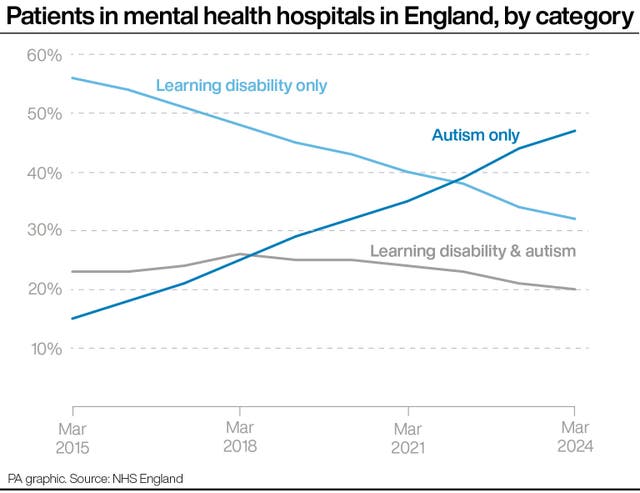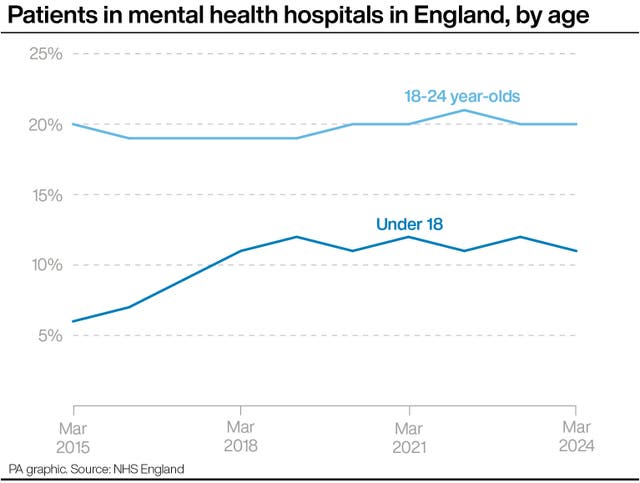Too many people with autism ‘still stuck’ in mental health hospitals – charity
New figures suggested an NHS England pledge on reducing the number of inpatients had not been met.

Autistic people and those with a learning disability are still being failed, a charity has said, describing new figures as showing too many remain “stuck” in mental health hospitals.
NHS England had pledged to reduce by March this year the number of inpatients to less than half of 2015 levels.
But figures published on Thursday suggested that target had not been met.

In March 2015, the figure was 2,905 – meaning there had been a reduction of around 30%.
The 2019 NHS Long Term Plan stated that: “By March 2023/24, inpatient provision will have reduced to less than half of 2015 levels (on a like-for-like basis and taking into account population growth).”
Some 220 of the inpatients in March this year were under 18, the figures showed, with the percentage of children almost doubling from 6% in 2015 to 11%.

The percentage of patients with autism only had jumped from 15% in March 2015 to 47%, while the percentage with a learning disability only had fallen from 56% to 32%.
Around a fifth of inpatients were both autistic and had a learning disability, down slightly from 23% in March 2015.
Jackie O’Sullivan, from learning disability charity Mencap, said the figure was a “stark reminder of how much people with a learning disability, autistic people, and their families have been failed by governments over more than a decade”.
She said there had been “some progress transforming care” since the Winterbourne View scandal, uncovered in 2011 when an undercover documentary team filmed abuse of patients with learning disabilities at the private hospital near Bristol.
But Ms O’Sullivan added: “Still far too many people remain stuck in mental health hospitals when they don’t need to be there.
“No matter where you live in the country, you shouldn’t have to worry about being inappropriately detained in a mental health hospital.”
Mencap said it had estimated the missed target to reduce numbers of inpatients by 50% would not be achieved at the current pace of change until at least 2030.
They called for a “revised and strengthened action plan”, setting out how the Government would “bring this national scandal to an end”.
The National Autistic Society said the “missed target is the latest in over a decade of broken promises” and described the situation as “one of the greatest human rights crises of our generation”.
“Detaining autistic people in mental health units can be harmful and damaging; they deserve better and should be getting the correct support for their needs.
“There must be a complete overhaul of the system.”
An NHS England spokesperson said there has been increased investment in community support, and “while there is more to do, significant progress has been made”.
They added: “Staff continue to work hard to ensure patients are discharged into community settings safely and in a timely way, and the NHS will be working with local systems this year to ensure all areas have plans in place to address the increase in the number of autistic people and continue to ensure people are admitted only where necessary for mental health treatment.”
A spokesperson for the Department of Health and Social Care said: “The Government is committed to ensuring that autistic people and those with a learning disability have the right support to lead ordinary lives in their communities, which can be a complex process and needs to be tailored to individual needs.”
They echoed NHS England’s comments that while progress has been made “there is more to do, particularly for autistic people”.
They added: “In 2023/24, we invested an additional £121 million to improve community support, and we have set out to NHS bodies and local authorities how they should work together to support people to be discharged from mental health inpatient services.”





